THE QUEEN’S GAMBIT – Limited Series
Orphaned at the age of nine, a prodigious introvert discovers and masters the game of chess in 1960s America. But child stardom comes at a price...
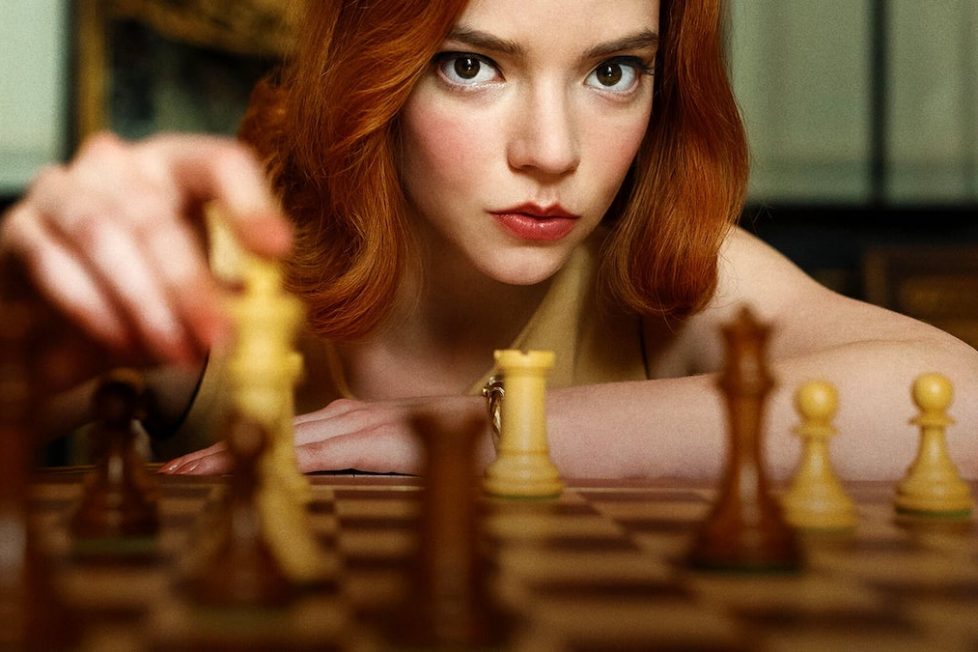
Orphaned at the age of nine, a prodigious introvert discovers and masters the game of chess in 1960s America. But child stardom comes at a price...


Walter Tevis was an American novelist with three books adapted into successful movies: The Hustler (1961), The Man Who Fell to Earth (1976), and The Color of Money (1984). His 1983 novel The Queen’s Gambit didn’t get the big screen treatment, although many planned adaptations fell through (one would have been Heath Ledger’s directorial debut, starring Ellen Page). But then Netflix ordered a limited television series, written and directed by Scott Frank (Logan), which plays more to the story’s long-form strengths.
The Queen’s Gambit follows the rise of chess prodigy Beth Harmon (Isla Johnston), whose mother was killed in a car crash when she was nine, resulting in her being sent to an orphanage. A withdrawn person by nature, Beth nevertheless makes friend with a more outgoing black girl called Jolene (Moses Ingram), and finds comfort in the tranquilliser pills every orphan’s prescribed daily.
Beth’s life takes a decisive turn when she meets the old janitor, Mr Shaibel (Bill Camp), who teaches her the game of chess. And it seems she has a natural aptitude for the game, quickly becoming capable of defeating adults members of a local chess club. A few years later, Beth (Anya Taylor-Joy) is eventually adopted by Alma (Marielle Heller) and her husband, so leaves to start a new life in Lexington, Kentucky, where her obsession for chess and addiction to sedatives result in a difficult transition to adulthood.
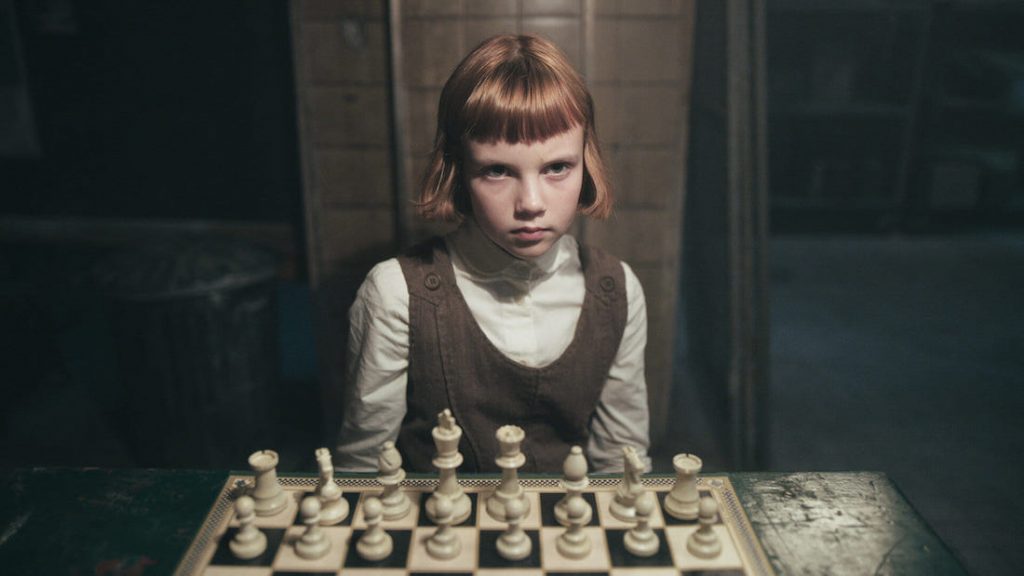
The Queen’s Gambit is an impressive miniseries that benefits from the many sound elements underpinning its lead character’s arc. The story is an engaging coming-of-age tale about a reclusive girl navigating the big wide world, but it’s likewise an underdog story about an orphan discovering she has a talent that could make her rich and famous. Those are two solid foundations for any series to build a strong narrative on.
Scott Frank is the creative force behind all seven episodes, which doesn’t outstay its welcome or offer much filler. His focus on the material never slips and there aren’t many pointless distractions to overlook thanks to the low episode count. Having a single authorial voice isn’t common for US television, but when adapting novels it’s arguably the preferred option if a single writer’s deeply invested in the source material.
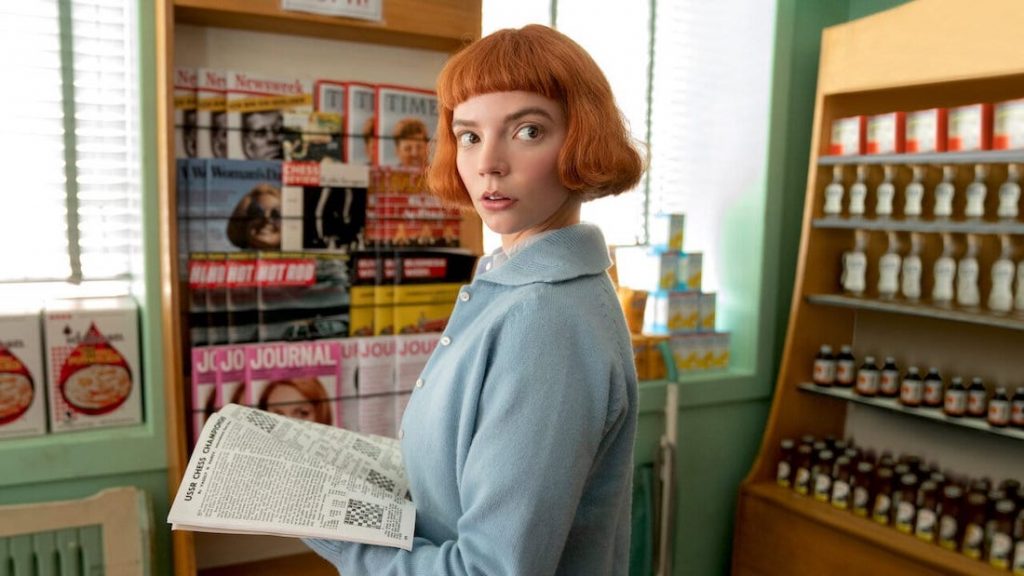
Even the fact The Queen’s Gambit is a period drama adds extra appeal, as it has the vibe of a sophisticated series like Mad Men (2007-2015) but with a bigger budget and more feel-good intentions. The locations are startlingly accurate and the production team travelled Berlin to shoot scenes that give the look and feel of the series a real boost. Uli Hanisch (Babylon Berlin) created beautiful sets that faithfully recreate mid-20th-century America, Mexico, France, and Russia. It’s often just a treat to soak up the details of the furnishings and fashions.
The first episode, “Openings”, is a surprisingly bold beginning because it’s almost like a prequel film, with Anya Taylor-Joy appearing only briefly in media res. We actually spend most of the time with Isla Johnston as a younger Beth, who has a wonderful rapport with Bill Camp as her unlikely chess tutor. I’d have enjoyed a series entirely set in the orphanage, frankly, but each of the remaining six episodes take us to fresh places and years that inform Beth Harmon’s evolution—both as a chess player and as a lonely young woman with trust issues. This gives each episode something of its own identity and significance to her amazing life, being a tiny piece of the story that gives Beth increasing depth and nuance.
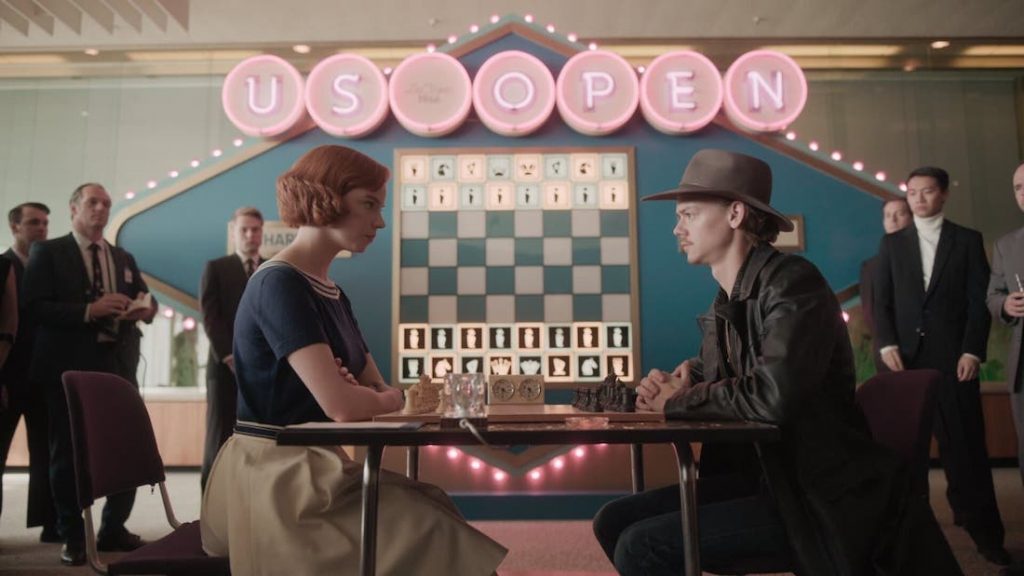
One concern with The Queen’s Gambit is whether it’ll please viewers who can’t play chess and have no interest in it. But the series excels at making this game seem accessible and (whisper it) exciting, so it’ll undoubtedly inspire people to play a few games for themselves. Former World Chess Champion Garry Kasparov and chess coach Bruce Pandolfini were hired as consultants, to ensure each game was legitimately played and wouldn’t be condemned by eagle-eyed chess masters. Many of the games are recreations of famous ones that happened in tournaments, but with embellishments and improvements. This all adds to the show’s already keen sense of authenticity, and it’s great to know that genuine chess experts approve of what’s on screen and feel The Queen’s Gambit accurate reflects the game.
Translating chess to the screen isn’t easy, in terms of making it look dramatic and interesting. The Queen’s Gambit gets around this problem by approaching each game in a different way, visually, or by ignoring the chess moves in favour of the player’s concentrated expressions and the reactions of spectators. Sometimes Beth’s wins aren’t even shown on camera, we just see her celebrating a win afterwards.
The series does give Beth a quasi-superpower in how she uses sedatives to calm her mind, to better imagine a giant chessboard on the ceiling whenever she goes to bed, where the pieces zip around in a mental practice. It’s a cool visual element that comes into play to spine-tingling effect many times, and knowing it’s based on how some grandmasters pre-visualise moves means it doesn’t feel stupid.
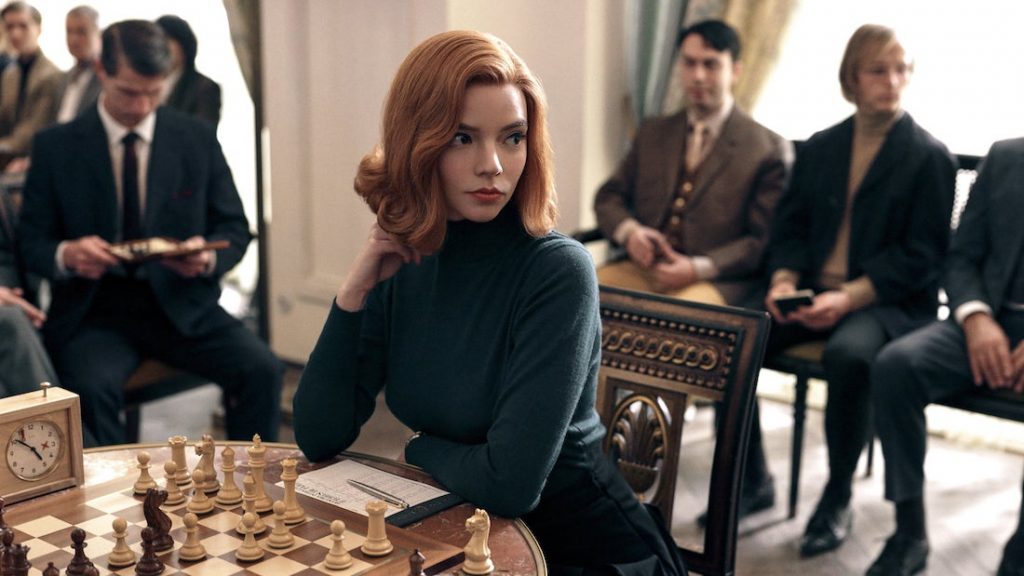
Anya Taylor-Joy has been quietly making a name for herself after coming to widespread attention in The Witch (2015) and Split (2016), but this role is tailor-made for her. She’s both believably gawky and shy in earlier episodes, then assuredly glamorous and troubled in the later ones. Her development as a teenager is intelligently handled, particularly when her adopted mother realises she’s bringing up a genius whose abilities might actually earn them some money.
As Beth’s mother, Marielle Heller is wonderful in a role I assumed was going to be blocking Beth from achieving her destiny. Then I started to suspect she was going to be a ‘pushy parent’ only interested in the money Beth’s chess-playing can make her. Instead, Alma became one of the best characters once we realise she’s similarly lonely, as her own talent (for playing the piano) was undernourished and she wound up stuck in a loveless marriage as a downtrodden housewife.
There are a lot of other memorable supporting roles, too. The aforementioned Bill Camp has a brief but memorable role as the dour janitor quietly astonished this little red-haired girl is a skilled chess player. I also enjoyed the two chess champions who each have a positive influence on Beth’s evolution as a player: nerdy Harry Beltik (Harry Melling), who develops a crush and uses their mutual love of chess to get closer; and eccentric grandmaster Benny Watts (Thomas Brodie-Sangster), who spots a potential World Champion in Beth and wants to help her compete with the dominant Soviet players.
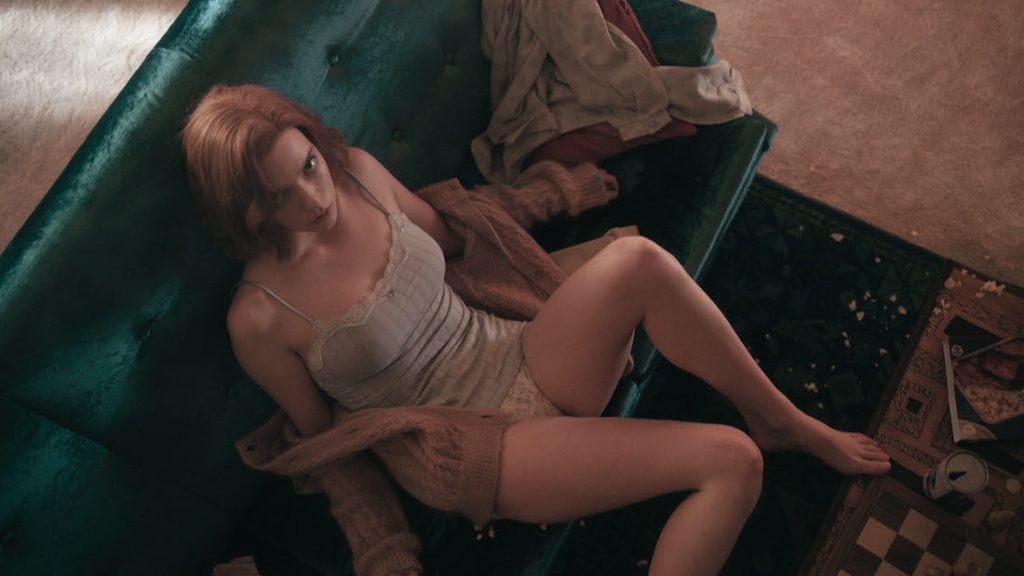
The Queen’s Gambit is almost ‘Rocky with Rooks’. There’s even a training montage and the series ends with a trip to Russia at the height of the Cold War, with Beth set to play the fearsome Soviet grandmaster Vasily Borgov (Marcin Dorociński). These scenes add a further layer to the series, in seeing how different US-Russian relations were back in the late-1960s, with Beth having to be chaperoned by a Federal agent while in Moscow.
What stood out to me about this Netflix drama is how it avoided obvious directions, particularly in communicating the culture of chess. I expected it to be filled with vengeful players and devious grandmasters, who all bristle at Beth (a woman) beating them. But most of the players are shown to be courteous and professional, even in defeat, which shows the game in a positive light and helps diminish preconceptions this culture is full of big-brained narcissists and inhuman people with no social skills. (Although there’s obviously a bit of that at times, and I daresay the show puts a coating of feel-good over the reality of chess tournaments.)
The overriding message is that Beth’s success hinges on the friendships and relationships she forms along the way, which she learns to weave into a life she’s more comfortable living alone. There’s not even a villain in the usual sense, as Beth’s her own worst enemy and it’s the internal battle with yourself that The Queen’s Gambit explores so brilliantly.
If you’d like to support my writing directly, please buy me a coffee.
USA | 2020 | 393 MINUTES • 7 EPISODES | 1.78.1 | COLOUR | ENGLISH

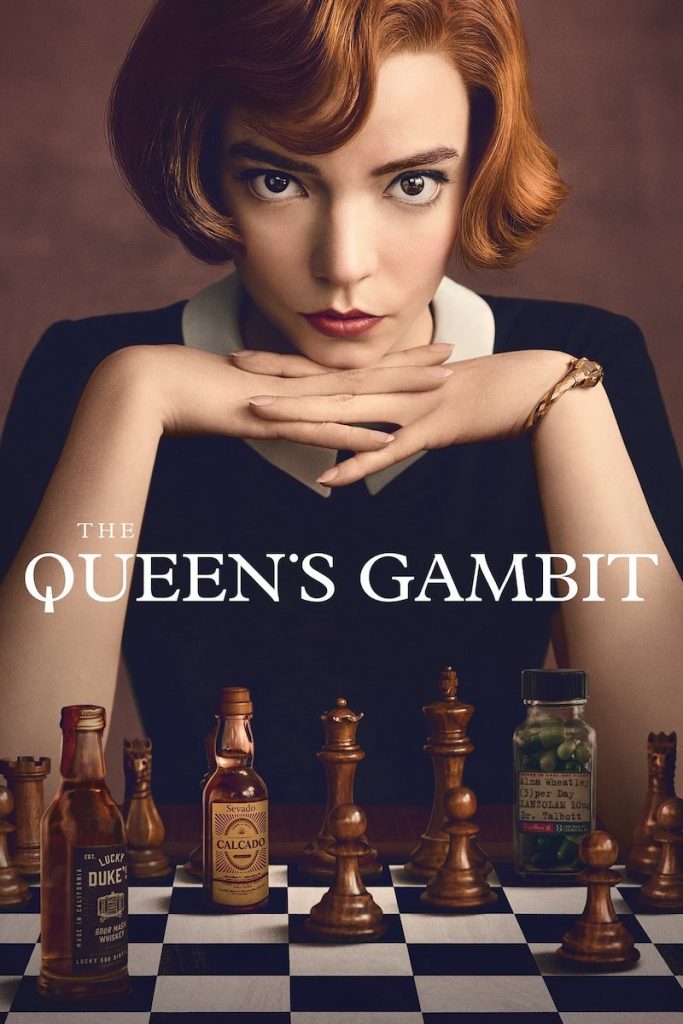
writer: Scott Frank.
director: Scott Frank (based on the novel by Walter Tevis).
starring: Anya Taylor-Joy, Bill Camp, Moses Ingram, Isia Johnson, Christiane Seidel, Rebecca Root, Chloe Pirie, Akemnji Ndifornyen, Marielle Heller, Harry Melling, Patrick Kennedy, Jacob Fortune-Lloyd, Thomas Brodie-Sangster & Marcin Dorociński.
